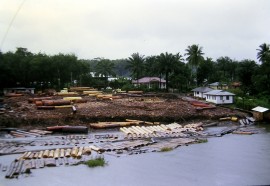Niger River Delta, Nigeria
Pollutant: Petroleum
Population Affected: There is currently disagreement among experts and further investigation is required.
The Niger River Delta is a densely populated region that extends over about 70,000 km2 and makes up nearly 8% of Nigeria’s land mass. It is heavily polluted by oil and hydrocarbons, as it has been the site of major petroleum operations since the late 1950s.[1] Between 1976 and 2001 there were nearly 7,000 incidents involving oil spills where most of the oil was never recovered.[2] As of 2012, some 2 million barrels (320,000 m3) of oil were being extracted from the delta every day.[3] Groundwater and soil have been heavily polluted in the process, which has also devastated aquatic and agricultural communities.[4]
An average of 240,000 barrels of crude oil are spilled in the Niger delta every year due to mechanical failure, third party activity, and many unknown causes. The spills have not only contaminated the surface and ground water of the delta but also the ambient air and locally grown crops with hydrocarbons, including known carcinogens like polycyclic aromatic hydrocarbons (PAHs).[5] A 2011 report from UNEP concluded that soil and groundwater pollution levels exceeded national standards at two-thirds of reviewed locations in and around the Niger delta.[6] These spills have affected local population health in a number of ways. One article published in the Nigerian Medical Journal in 2013 estimated that the widespread pollution could lead to a 60% reduction in household food security and a 24% increase in the prevalence of childhood malnutrition. This is in addition to the fact that the crude oil is likely hemotoxic and can cause infertility and cancer.[7]
[1] UNEP, 2011. Available at: http://www.unep.org/science/chief-scientist/Activities/DisastersandConflicts/OilPollutionintheNigerDeltaNigeria.aspx
[2] Amnesty International. Nigeria: Petroleum Pollution and Poverty in the Niger Delta”. ”. United Kingdom: Amnesty International Publications International Secretariat, 2009.
[3] Isumonah, V. Adelfemi (2013). "Armed Society in the Niger Delta". Armed Forces & Society 39 (2): 331–358.
[4] The New York Times, 2010. Available at: http://www.nytimes.com/2010/06/17/world/africa/17nigeria.html
[5] Ordinioha, B. "The Human Health Implications of Crude Oil Spills in the Niger Delta, Nigeria: An Interpretation of Published Studies." Nigerian Medical Journal 54.1 (2013).
[6] UNEP, 2011. Available at: http://www.unep.org/science/chief-scientist/Activities/DisastersandConflicts/OilPollutionintheNigerDeltaNigeria.aspx
[7] Ordinioha, B. "The Human Health Implications of Crude Oil Spills in the Niger Delta, Nigeria: An Interpretation of Published Studies." Nigerian Medical Journal 54.1 (2013).




